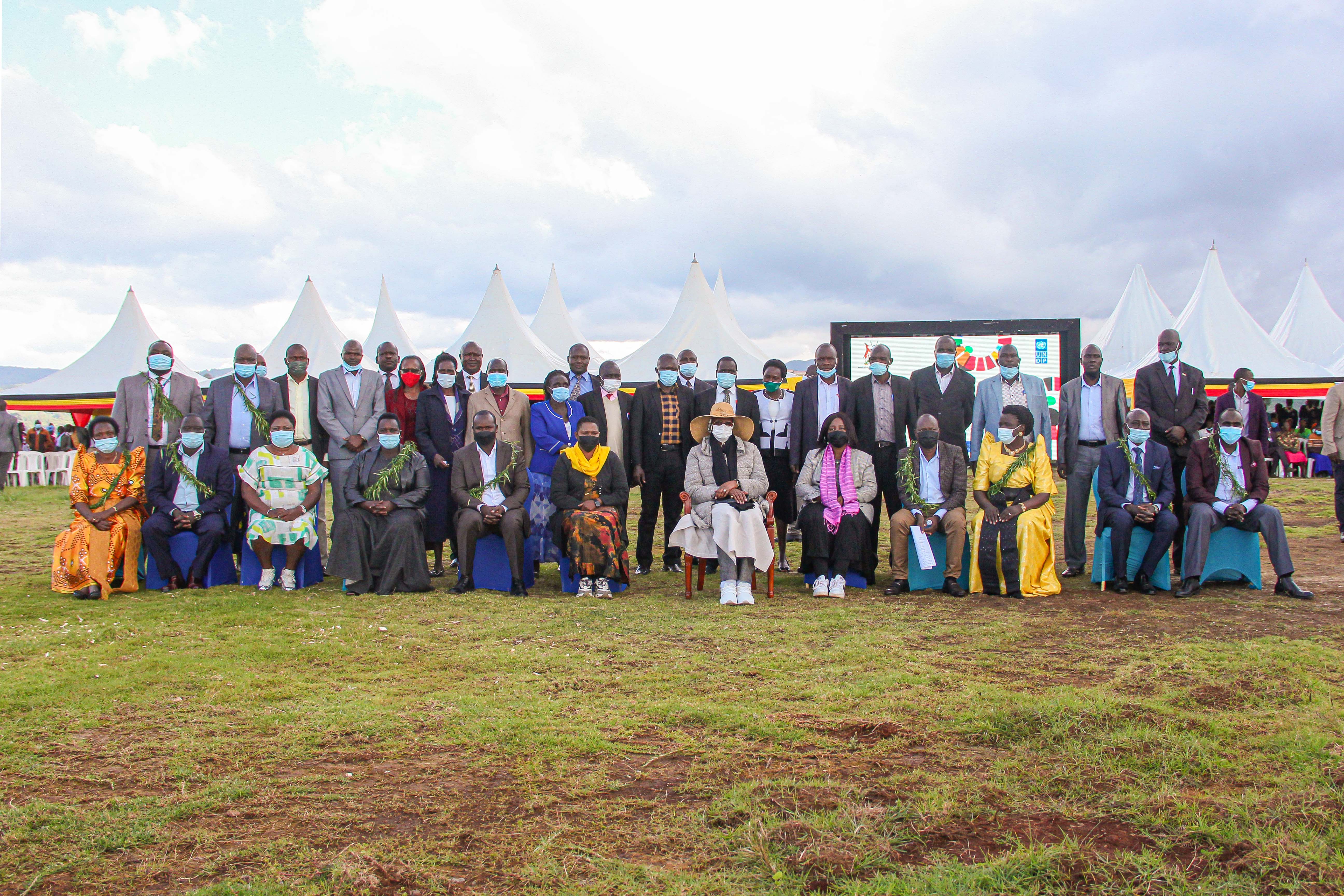Ministry of Education Partners with UNDP to Promote Environment Conservation in Schools
October 13, 2022
The First Lady and Minister of Education and Sports Hon. Janet Kataaha Museveni during the launch of the Greening Schools project. Looking on is UNDP Deputy Resident Representative Ms. Sheila Ngatia.
The Ministry of Education and Sports has partnered with the United Nations Development Programme (UNDP) to promote environment conservation in schools through implementation of the Greening Schools project designed to address climate change impacts and their causes, while promoting sustainable development and a green economy.
The project was launched by the First Lady and Minister of Education and Sports Hon. Janet Kataaha Museveni on Tuesday 11 October 2022 at Teryet Secondary School in Kapchorwa district and will be rolled out in collaboration with the Ministry of Water and Environment. The project also seeks to influence positive behavioural change in young people on climate change actions and position them as ambassadors in conserving natural resources and averting environmental degradation.
The project will support the greening of bare school land in 381 Seed Secondary Schools across the country, promote environmental education and awareness in schools, improve energy efficiency in cooking and lighting, improve efficiency in water harvesting and empower young people to understand and appreciate nature. The project will also support growing of boundary hedges to secure schools’ land, trees that will act as both boundary markers and shade trees, woodlots, ornamental trees, and fruit trees. In addition, tree nurseries will be established in selected model schools as well as climate-smart agriculture demonstrations.
The intervention is a strategic entry point for Uganda’s education sector to demonstrate what can and is being done with respect to: reafforestation, energy conservation, reducing greenhouse-gas emissions, reducing waste use, improving water quality, and empowering the young people in environmental conservation.
“If we can all make a pledge here today, to support the drive to promote ‘one child, one tree’ every year, then we will achieve our goal to restore Uganda's forest and green cover by planting more than 20 million trees by 2026, targeting 3.5 million trees every year,” said UNDP Deputy Resident Representative Ms. Sheila Ngatia during the launch.
UNDP Deputy Resident Representative Ms. Sheila Ngatia plants a tree during the Greening Schools launch at Teryet Secondary School in Kapchorwa district.
Speaking during the launch, Hon. Janet Kataaha Museveni said the project will help mitigate the effects of climate change in schools,
“This project will greatly contribute to ecosystem restoration while nurturing the younger generation and their communities to appreciate the need to champion stewardship of the environment and the general well-being of the planet, as entrusted to us by God.”
She thanked the athletes that were present for endorsing the strong message of environmental conservation. “God has used you to raise our flag globally and we’re very proud of you. As role models for our young people, we implore you to play an active role in championing this cause,” she added.
The athletes who attended the launch include world champion, Joshua Cheptegei.

The First Lady and Minister of Education and Sports Janet Kataaha Museveni (centre with a hat), the UNDP Deputy Resident Representative Ms. Sheila Ngatia and other Government and UNDP officials during the launch
Climate change effects in schools
The project is in response to the effects of climate change which are wide-ranging, affecting all segments of society. In the education sector, the effects include damage and destruction of school infrastructure such as classrooms, boundary fences, causing displacement and psychosocial stress.
Climate change is also altering Uganda’s weather patterns which come with negative impacts on agriculture, food production and food security.
The lessons learned from the initiative will be replicated in selected schools using the ‘School Environmental Clubs’ to drive this strong message of behaviour change for lasting restoration of communities.
Students at Teryet Secondary School perform a skit on the importance of environmental conservation in their communities
Context
Over 96% of schools in Uganda use wood fuel for cooking, followed by charcoal which is used by 4% of the schools. The demand for wood is putting immense pressure on the forests around cities and towns, given that cities and towns are expanding. This rate at which biomass is being used in Uganda’s social institutions, especially schools and universities, hospitals, and prisons is not sustainable.
It is estimated that the country continues to lose trees in an area of approximately the size of a football pitch everyday hence moving from 4.9 million hectares of forests in 1990 to 1.8 million hectares by 2018.
Current national deforestation rates stand at 2% annually with an average of 122,000 hectares lost every year. That means if nothing is done, there will be irreparable damage to our environment and eventually our way of life. By implementing these initiatives in schools, hubs of learning will be created for communities.

 Locations
Locations